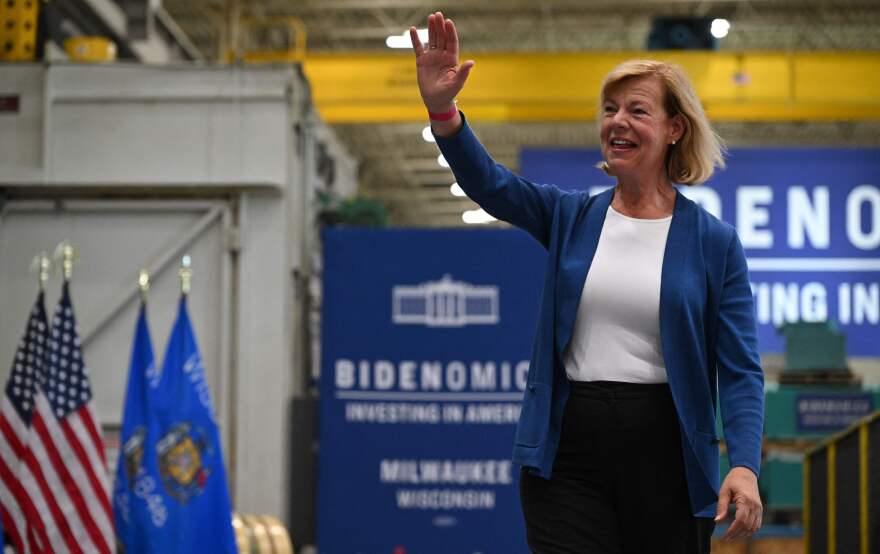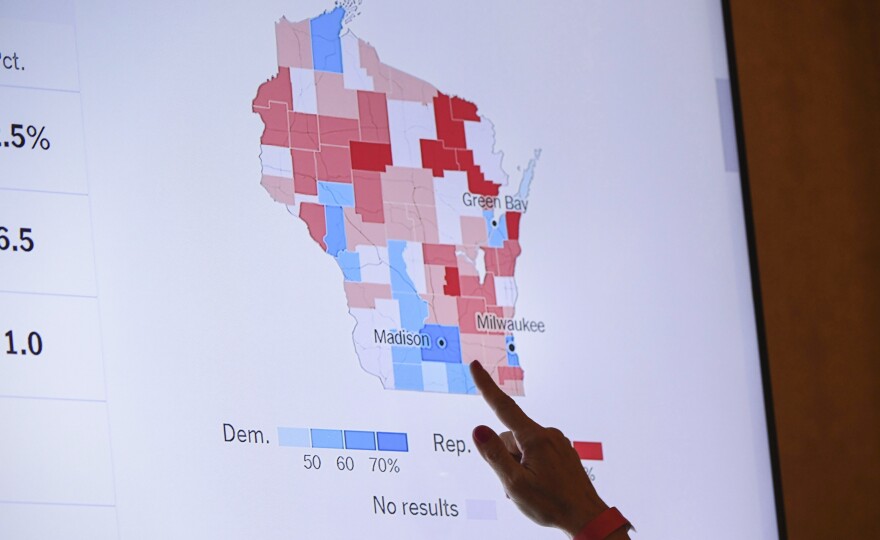The Republican Party is shifting its attention this week to Milwaukee, a city that will host both the first GOP presidential primary debate on Wednesday and the party's nominating convention next summer.
Wisconsin is one of the most hotly contested states in the country, and the decision by Republicans to bookend their primary process there is a clear sign that the closely divided state will, again, be a major focus in 2024.
Scott Walker, a former Wisconsin governor and a former Republican presidential candidate, said Wisconsin is the very definition of a swing state.
"Donald Trump defeated Hillary Clinton by about 23,000 votes," Walker said in an interview. "Four years later, it was even closer with about a 20,000-vote margin. So you're talking about a handful of voters across a state of about 6 million people making up the difference between who carries the 10 Electoral College votes and who doesn't."
Wisconsin has been at the center of some critical moments in the past few elections. It used to be considered part of the Blue Wall, a term for a bloc of midwestern states that reliably voted for Democrats in presidential races since the late 1980s.
But the state slipped from the wall in 2016 when Wisconsin voted for Trump over Clinton. Joe Biden regained the state for Democrats in 2020.
Today, the state's two U.S. senators are of opposing parties. The legislature is Republican-led, while the governor is a Democrat. And presidential races remain consistently tight.
"The thing everyone should understand about Wisconsin is that it is, most of the time, incredibly close, even when you think it can't possibly be close," said Ben Wikler, chair of the Wisconsin Democratic Party. "Four of the last six presidential elections have had margins of victory under 1 percentage point."
Weakening GOP support in the suburbs
In many ways, Wisconsin is a state divided.
There are the dairy-farming, soybean-growing rural areas in the north and west — deep red and heavily backing Trump.
And there are the vote-rich urban areas around Milwaukee and Madison. The city centers and nearby suburbs, along with small university-centered cities in other parts of the state, are longstanding strongholds for Democrats.
Many suburban areas used to lean heavily for Republicans. But Democrats are gaining ground, thanks in part to Trump.
Analysts like Charles Franklin, the director of the Marquette Law School poll, say those suburban areas are becoming more diverse and voters there are far more skeptical of Trump. They are also rejecting GOP positions on things like abortion and culture issues.
"The weakening Republican support in the suburbs is not only a reaction to Donald Trump, though he's part of it; it represents a broader movement," Franklin said. "But it is also, I think, that the modern Republican Party has stronger appeal among very conservative and rural voters."
Abortion on the ballot
Reproductive rights, in particular, have been motivating Wisconsin voters in the months since the U.S. Supreme Court struck down the constitutional right to an abortion. The state now has a near-total ban on abortion in effect. That drove huge turnout for an election earlier this year in which Judge Janet Protasiewicz was elected after campaigning explicitly to protect abortion rights.
Democrats say they are going to build on that election success in 2024. The party worked across the state to register new voters, including major increases on college campuses in cities, said Celinda Lake, a pollster for Democrats, including President Biden.
"What's good about Wisconsin and what is our ace in the back of our pocket is that the Supreme Court races helped to register turnout and draw the contrast on abortion," Lake said. "And that just has to be tapped into again. It doesn't have to be created."
Lake said abortion has become one of the strongest motivators for voters in Wisconsin and across the country.
"People keep asking, 'Isn't the abortion issue going to wane?' and my answer to them is, as long as sex and pregnancy have not ended, no, the abortion issue is not going to wane," she said. "It's very, very salient to women and it's very salient to young people. And there is a very vivid contrast in Wisconsin."
Voters were very clear about that contrast at a recent farmers market in Brookfield, a traditionally Republican suburb of Milwaukee.
Jen Koch, a registered nurse, voted for Mitt Romney in 2012 but has voted for Democratic presidential candidates since then — driven by the issue of reproductive rights.
"You know, I don't think that you should be legislating health care decisions like that," she said. "That should be a private decision. It doesn't affect the people who are screaming the loudest."
At the same market, Ellen Lindop said she's voted for both parties, but only Democrats in the last 10 years. When asked what issues were mobilizing her, she said: "I think everyone's top of mind [is] reproductive rights, and basically our freedoms, you know, the Republican Party talks about freedom, and I feel they're the ones taking our freedoms away. So it's really all about freedom."
Democrats know they have to turn out voters like Koch and Lindop to win next year.
Republicans aim to counter on economics
But Republicans believe they can make up ground by avoiding talk of Trump and baseless claims about election fraud, and focusing instead on people's personal sense of wellbeing.
"Every second that we spend talking about the 2020 election is a second lost, because we're not talking about the economy," said Bill McCoshen, a GOP strategist in Wisconsin. "At the end of the day, voters always vote their pocketbook first."
McCoshen says Republicans can't let Democrats outperform them so significantly in Milwaukee and Dane counties, where Milwaukee and Madison are.
"Democrats are rolling up significant margins [there]," he said. "In the last election cycle, it was nearly 300,000 votes. And it's tough for Republicans to make that up over the remaining 70 counties. So Republicans have to do a better job in both Dane and Milwaukee County. They can't get beat 80% to 20%, or 75% to 25%, if they want to win."
Republicans running statewide races will also have to focus on turning out votes in vast rural areas of the state where it is traditionally harder to organize and communicate with voters.
Gene Ulm, a partner at the Republican polling firm Public Opinion Strategies, said the party needs a message that can engage them.
"We have been effective in turning out those voters in the past," Ulm said. "I think it's about regaining a bit of some lost magic and then applying it to new areas."
A critical Senate seat

Voters in Wisconsin next year will also be deciding who should represent them in the Senate. Democratic Sen. Tammy Baldwin is running for a third term and Republicans have struggled to recruit a challenger. Baldwin easily won reelection in 2018 and pollsters and strategists say she consistently polls well today.
"What Tammy Baldwin has been able to do is advocate for ... [progressive] ideas, but at the same time appeal to the blue collar or to mainstream, you know, working class Democrats who tend to stray in these elections," said JR Ross, a Wisconsin political analyst. "The last time she ran [in 2018], she ran well ahead of [Democratic Gov. Tony] Evers and Democrats who won statewide."
David Bergstein, communications director at the Democratic Senatorial Campaign Committee, said the competitive Senate race gives Democrats an opportunity to build on Baldwin's campaign strategies and organize more effectively in the state.
"I think you'll see the campaigns in Wisconsin really running and executing that playbook," he said. "And by working together, we'll be able to maximize the voters we need to win."
Walker, the GOP former governor, said that's why Republicans need to focus on organizing and speaking directly to voters with a clear economic message.
"Conservatives need to connect the dots," Walker said. "If you want to start your own business, you want to pursue a career, you want to buy a home, you want to start a family, you want to do any of these things, conservatives need to make the case that we're the ones that put people in a better position."
Copyright 2023 NPR. To see more, visit https://www.npr.org.



